On May 14th 2017, during the opening ceremony of the 25th Harm Reduction International conference in Montreal, as Canadian federal Health Minister Dr. Jane Philpott delivered a keynote speech, activists and members of the audience participated in a silent protest organized by the Canadian Association of People Who Use Drugs (CAPUD).
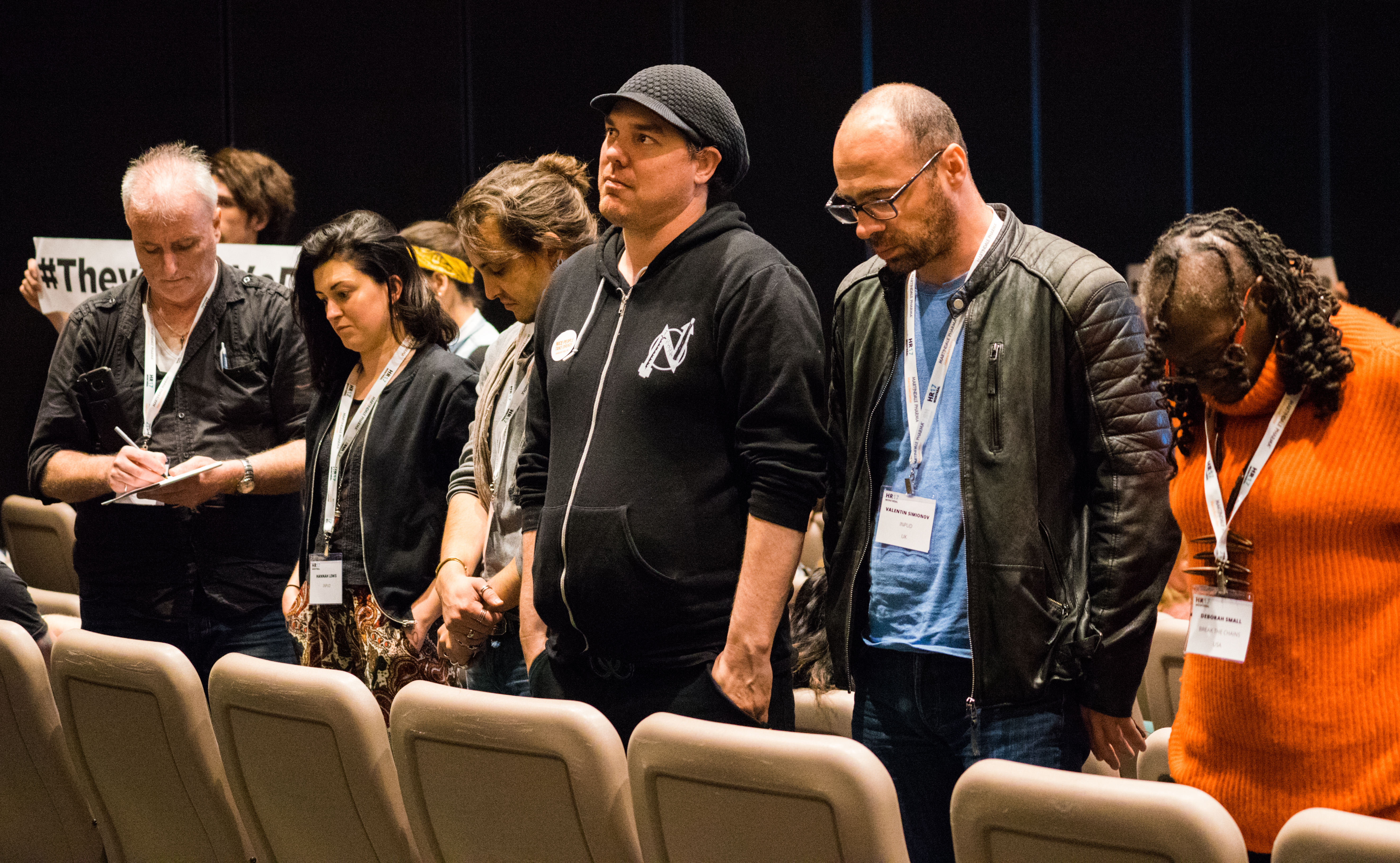
Credit: Nigel Brunsdon
In a symbolic gesture to the Canadian federal government, participants turned their backs to the Minister while she spoke and held signs that said “They Talk, We Die” or “Life Won’t Wait”, slogans from the National Day of Action on the Overdose Crisis that saw protests in eight Canadian cities earlier this year. This action was the latest demonstration organized by CAPUD to demand an immediate and adequate response to the overdose epidemic – a response that requires a rapid policy shift from punishment to health care and support.
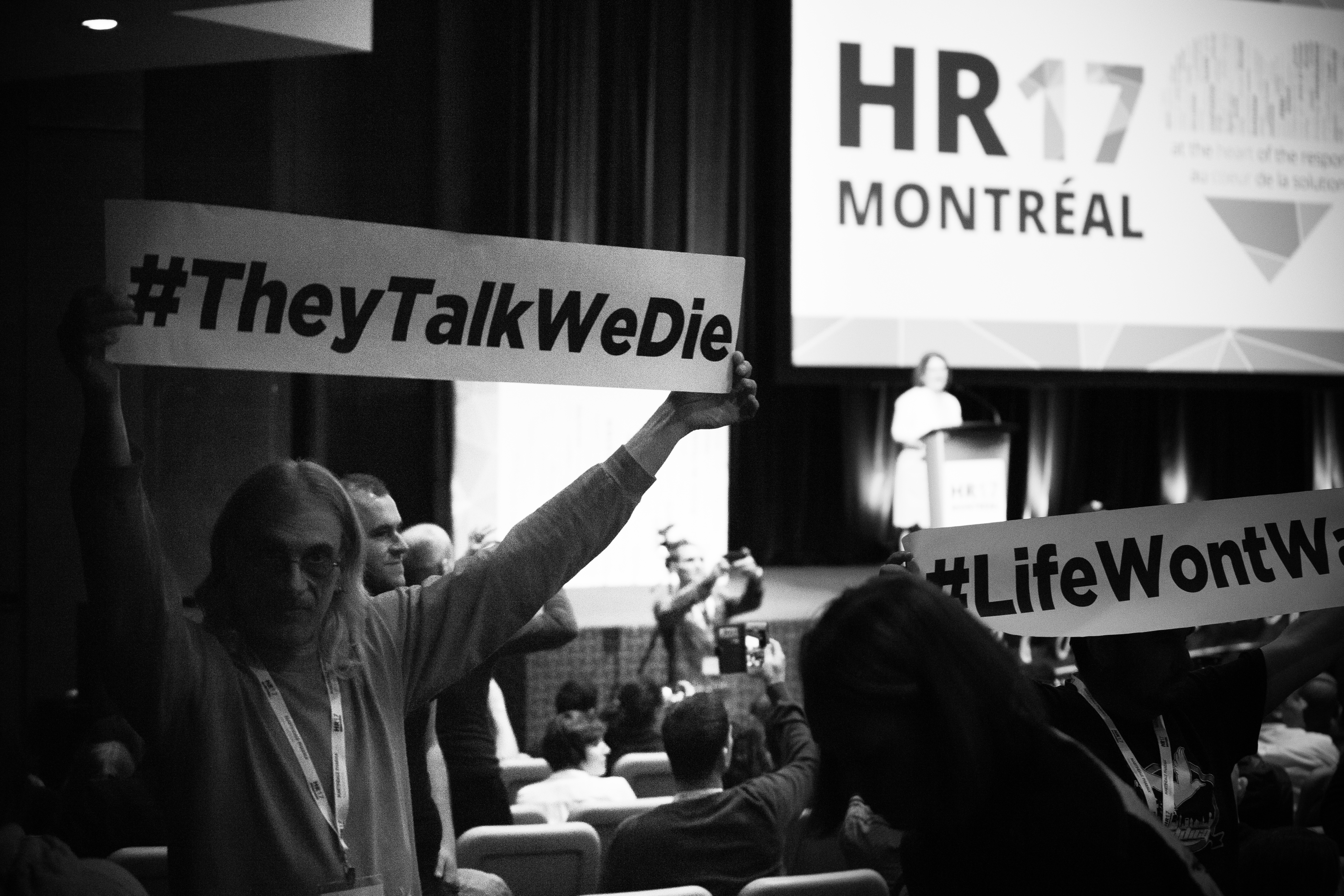
Credit: Nigel Brunsdon
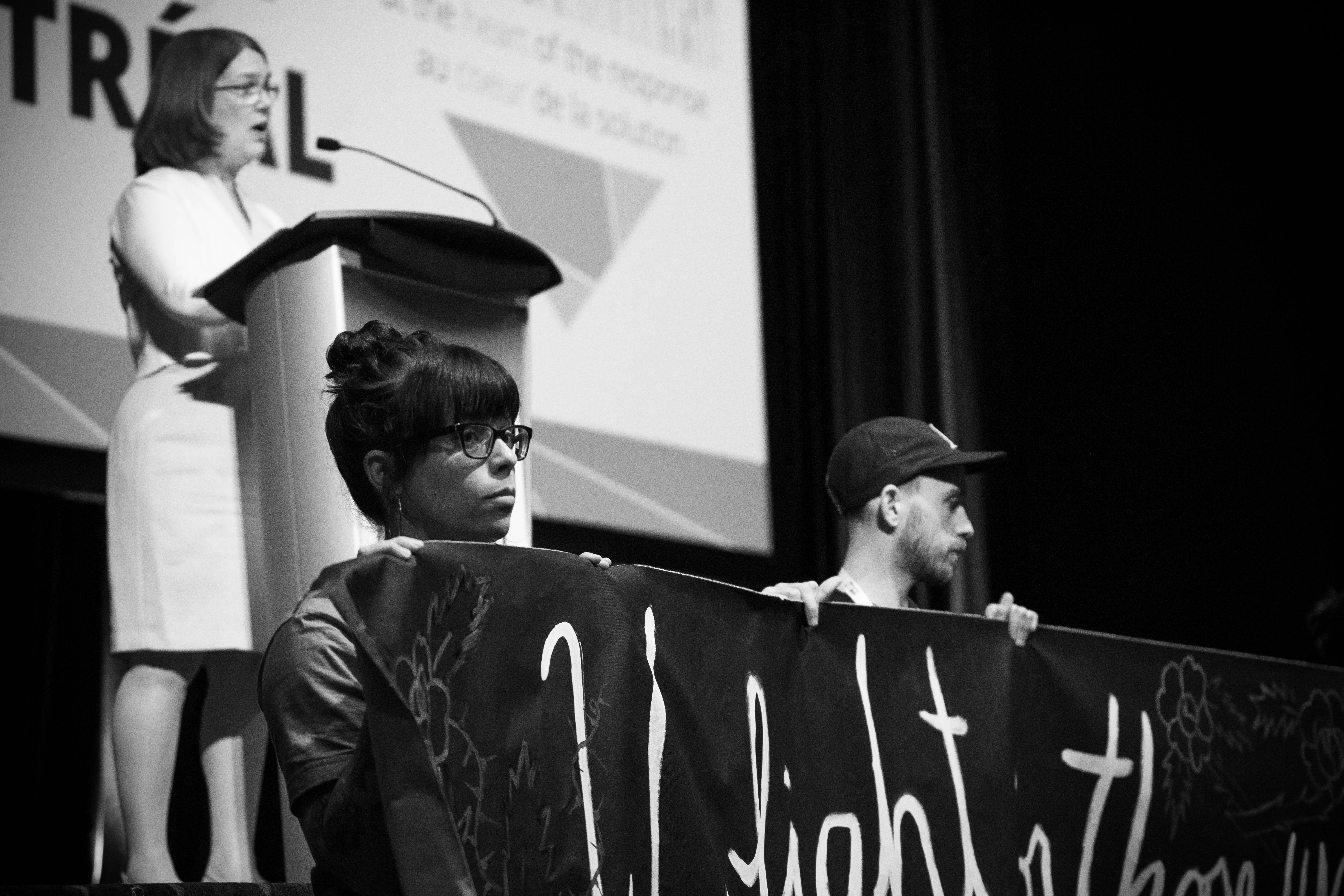
Credit: Nigel Brunsdon

Credit: Nigel Brunsdon
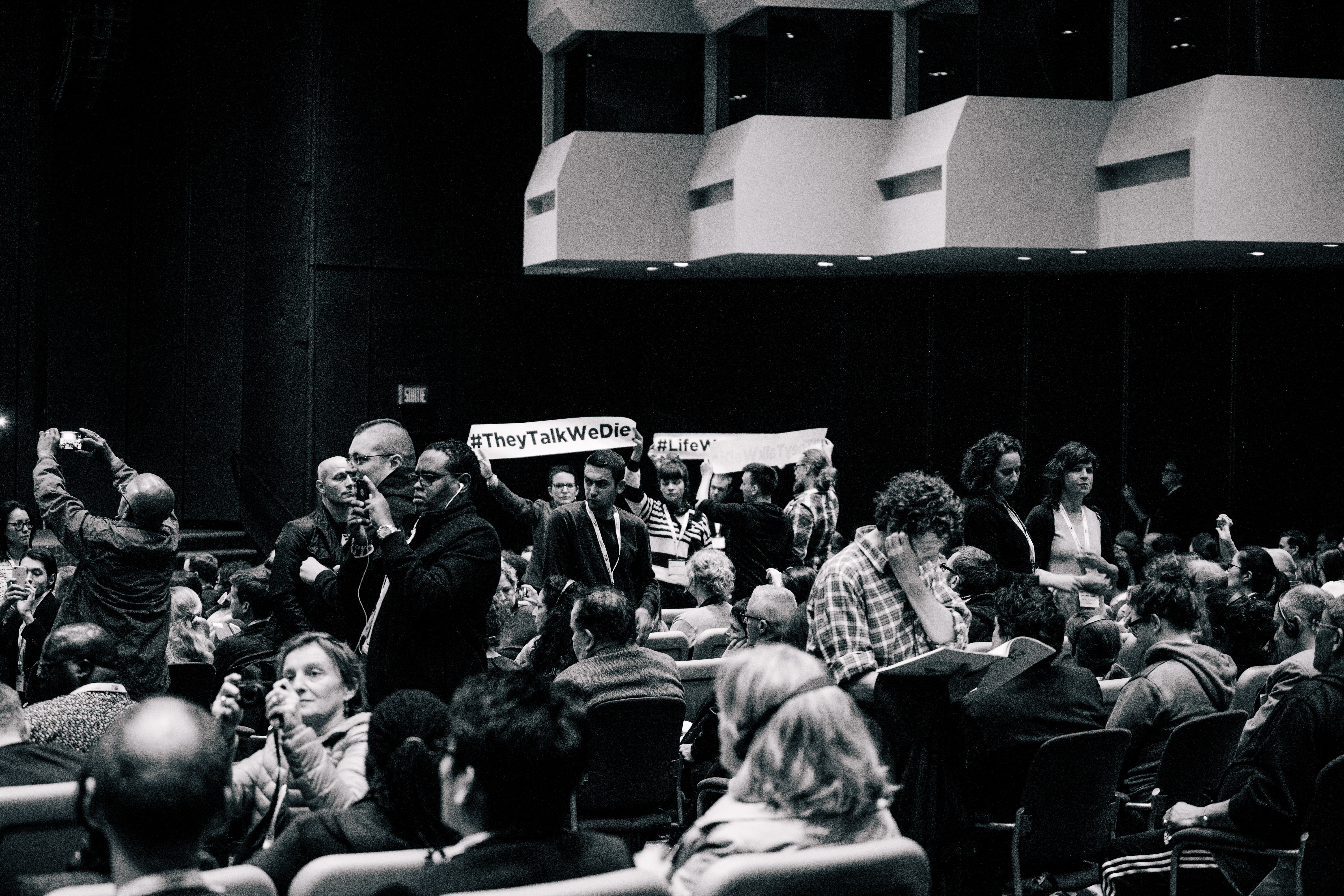
Credit: Nigel Brunsdon
Canada is currently facing the worst overdose crisis in its history. Overdose deaths have increased 327% since 2008, although at present, it remains difficult to determine exactly how many people have died since Canada does not have a national reporting system to collect and keep track of this information. Last week, the federal government released preliminary and partial data showing that 2458 apparent opioid-related deaths in 2016. In reality, this number is much higher. People are dying by the hundreds every month and this crisis shows no signs of slowing down. In British-Columbia alone, a province with a 4.5 million population, 935 people died in 2016. For the first quarter of 2017, the rate of overdose deaths has almost doubled from 19.7 to 30.5 per 100 000 persons.
During the conference, some local and international attendees reflected negatively on the silent protest saying that Minister Philpott appeared to be “the best health minister in the world” with respect to harm reduction. She surely made positive declarations on harm reduction since being appointed Health Minister and reinstated harm reduction in our national anti-drug strategy, introduced legislation to streamline the process for opening a supervised injection site, facilitated access to naloxone, and made it easier to import pharmaceutical-grade heroin. She also had to deal with the legacy of the Harper era, a 10 year period during which Canada became one of the biggest opponents to harm reduction on the international stage and implemented a national anti-drug strategy that excluded harm reduction altogether. And while Minister Philpott seems genuinely concerned with the alarming rise in preventable overdose deaths and likes to remind us, as she did during her keynote speech, that she is a fierce supporter of harm reduction, we need her to take action.

Credit: Nigel Brunsdon
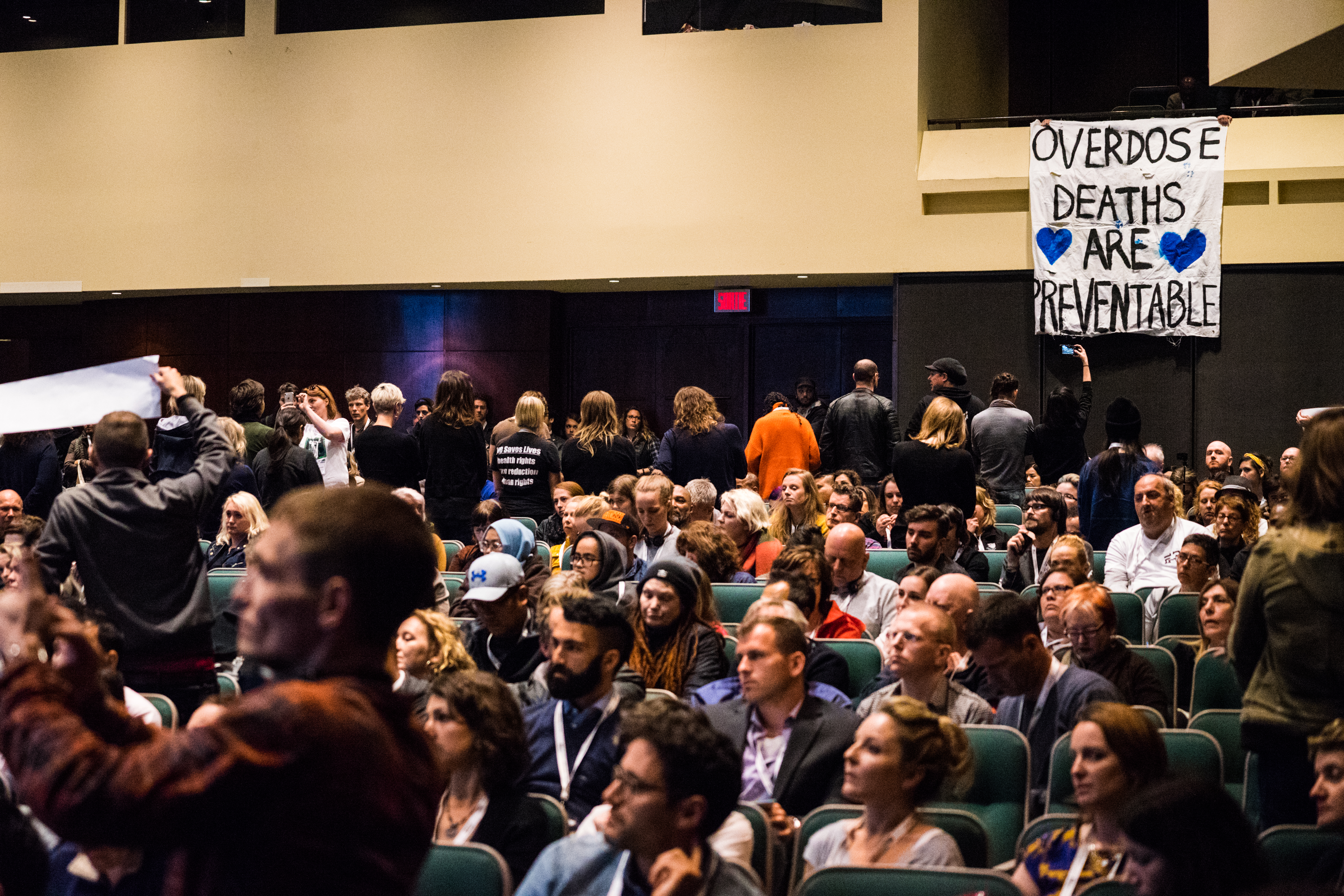
Credit: Nigel Brunsdon
We are facing an overdose crisis, not an opioid or a fentanyl crisis. People are dying because of failed policies: policies that stigmatize and marginalize people who use drugs, policies that force people to use alone, policies that restrict access to care and support, policies that fail to address social determinants of health, policies that are deeply rooted in racism and colonialism, and the list goes on. The federal government has no intention of addressing such failed policies. As such, it continues to locate opioids (and more specifically fentanyl) at the heart of the crisis and implement solutions that focus on drug prohibition, drug production, drug prescription and monitoring, and drug coverage. These solutions have been proven to be useless and costly at best but mostly harmful to people who use drugs and certainly not helpful in preventing overdose deaths.
This overdose crisis reveals the brutal nature of prohibition; something politicians cannot comprehend because they do not have a first-hand experience of it. It also reveals the inability of our political elite to go beyond warm-hearted humanist speeches and actually implement progressive and evidence-based policies that address the root causes of this overdose crisis namely prohibition, colonialism, trauma, poverty, mental health, stress, unemployment, homelessness, criminalization, institutionalization, racism, oppression, health inequities, and disenfranchisement. If the federal government was truly supportive and took this crisis seriously enough, it would channel money and resources toward the provinces to support harm reduction workers on the ground, increase access to health care and support, and create long-lasting (instead of Band-Aid) solutions.
If the federal government was truly supportive, it would adequately fund and engage with drug user associations and community-based harm reduction organizations. Much of the government spending has been directed at research, prescription monitoring, and law enforcement. We see no additional spending allocated to programs and services provided in the community by people with lived experience and harm reduction workers. We see no expansion of health care services nor support for the implementation of harm reduction services, including supervised injection services. Canada invested half a billion dollars during the SARS outbreak that fortunately caused just about 44 deaths. That equates to less than 1 week of overdose deaths in 2016 and, yet, the adequate funding needed to tackle the root of the problem is nowhere to be seen.

Credit: Nigel Brunsdon
Nice speeches do not save lives. Actions do. Our protest was a reminder that we cannot wait any longer. We ask Minister Philpott to declare a national public health emergency. We demand actions that will effectively stop the flow of dead relatives, friends, and colleagues overcrowding our morgues. And most importantly, we call on the federal government to engage on a path to decriminalize and regulate all drugs by ending the war on drugs.
Jean-François Mary is the Executive Director of the Quebec Association for the Health Promotion of People who Use Drugs (known as AQPSUD) (Twitter: @AQPSUD1), Jordan Westfall is the President of the Canadian Association of People who Use Drugs (CAPUD) (Twitter: @CAPUD2016), Marilou Gagnon is an Associate Professor in Nursing at the University of Ottawa and Founder of the Coalition of Nurses and Nursing Students for Supervised Injection Services (Twitter: @mlgagnon_XVII), Zoë Dodd is the Hep C Program Coordinator at South Riverdale Community Health Centre.
